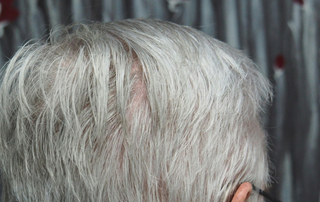Dealing with an itchy, flaky scalp can be frustrating and uncomfortable. But it can be a challenge to work out what’s causing it. Is it a simple case of dry scalp, or is it something more persistent, like psoriasis? While both conditions may look similar, there are some clear differences that can help you recognise which one you’re dealing with and how best to manage it.
In this article, we’ll break down the differences between scalp psoriasis and dry scalp, when to seek professional help, and how products like Polytar Scalp Shampoo could help manage symptoms and support a balanced and healthy scalp.
What is dry scalp?
Dry scalp is a common condition where the skin on your head loses too much moisture – usually due to damage to the outer layer of skin cells – or doesn't produce enough natural oils to stay moisturised. Just like other areas of the body, the scalp can become dehydrated, flaky and itchy. Dry scalp is commonly mistaken for dandruff, which is linked to an overgrowth of yeast (Malassezia) and faster skin cell turnover, rather than a simple loss of moisture.
What causes dry scalp?
Dry scalp has many causes, including:
- Weather changes: Cold, dry air in winter often worsens scalp dryness.
- Harsh hair products: Shampoos with sulfates or excessive use of styling products can strip natural oils.
- Frequent washing: Over-washing your hair may reduce natural sebum production, leaving your scalp unprotected from environmental damage, moisture loss, friction, and infections.
- Underlying skin conditions: Eczema and dermatitis can sometimes mimic dry scalp.
Symptoms of dry scalp
Dry scalp is often associated with the following symptoms:
- Small, loose white flakes, which are often more noticeable after scratching or brushing.
- Itching that improves with moisturising or switching to a gentler shampoo.
- Flakiness that tends to come and go depending on the weather or the products you’re using.
What is psoriasis?
Psoriasis is a chronic autoimmune condition that speeds up skin cell turnover. The body’s immune system mistakenly attacks healthy skin cells, leading to a buildup of thick, scaly patches that remain on the skin’s surface before they can mature and shed. When the condition affects the scalp, it’s called scalp psoriasis.
What causes scalp psoriasis?
Some common triggers of scalp psoriasis include:
- Genetics: A family history of psoriasis increases your risk.
- Stress: Emotional stress can worsen flare-ups.
- Cold weather: Similar to dry scalp, psoriasis often gets worse in winter.
- Certain medications: Such as lithium, some antimalarial medicines, anti-inflammatory medicines including ibuprofen, and ACE inhibitors (used to treat high blood pressure).
Symptoms of scalp psoriasis?
The most common scalp psoriasis symptoms include:
- Raised, inflamed patches covered with thick, silvery-white scales.
- Severe and persistent itching.
- Thick, greasy flakes that cling more than typical dandruff or dry scalp flakes.
- Temporary hair loss due to scratching or inflammation.
Dry scalp vs scalp psoriasis: the main differences
Although both dry scalp and scalp psoriasis involve itching and flaking, there are distinct signs that can help you differentiate between the two. With dry scalp, flakes are usually small, white and dry. They tend to fall off easily when you scratch or brush your hair. The itching is often mild to moderate and usually improves with hydration or by switching to a gentler shampoo. Dryness is typically spread evenly across the scalp without any raised, inflamed patches.
In contrast, scalp psoriasis produces thicker, more stubborn scales that may appear silvery or yellowish. These flakes don’t brush off as easily, and they’re often accompanied by raised, red plaques with well-defined borders. The itching is usually more intense, and scratching can sometimes lead to temporary hair loss.
How Polytar coal tar shampoo could help
Coal tar has been used for decades to treat skin and scalp conditions, such as psoriasis, eczema, and seborrhoeic dermatitis. Polytar Scalp Shampoo is a licensed medicine since 1960, which is formulated to treat – not just relieve – the symptoms associated with scalp conditions. Polytar contains a 4% coal tar solution, which works by:
Slowing down excessive skin cell turnover
In scalp psoriasis, skin cells multiply far faster than normal – sometimes up to ten times quicker. Coal tar works by reducing the speed of this cell turnover, allowing the scalp to shed skin at a more natural rate. Over time, this helps to thin out thick patches, reduce visible scaling and restore a healthier scalp surface.
Relieving itchiness
Itching is one of the most frustrating symptoms of both psoriasis and dry scalp. Coal tar contains compounds with mild anti-inflammatory and antipruritic (anti-itch) properties. By calming the inflammatory response in the skin, coal tar reduces the sensation of the itch, provides relief and helps prevent the scratch–flare-up cycle that can make scalp irritation worse.
Soothing irritation
Many people with dry scalp or psoriasis also experience redness, soreness or a burning sensation. Coal tar has a keratoplastic effect, which not only slows down excessive cell growth, but also softens and loosens thickened layers of skin. This helps to relieve discomfort and irritation.
As with all medicines, always read the label or leaflet carefully before use and consult with a healthcare professional if the condition persists or worsens.
Tips for managing scalp health
Whether you're dealing with dry scalp or scalp psoriasis, these care tips can help you maintain a healthy, comfortable scalp:
For dry scalp:
- Use a gentle shampoo and conditioner with hydrating ingredients to restore moisture.
- Avoid washing your hair every day — every 2–3 days is usually enough to maintain balance.
- Wash hair in lukewarm water instead of hot water, which can strip away natural oils and worsen dryness.
- If your flakes don’t improve with standard moisturising shampoos, consult a healthcare professional.
For scalp psoriasis:
- Consult a healthcare professional to confirm the diagnosis and appropriate treatment.
- Avoid scratching, as this can worsen irritation and lead to temporary hair loss.
- Manage stress through relaxation techniques like yoga or meditation, as stress is a known trigger.
- If symptoms persist, follow up with your GP or a dermatologist for more targeted treatment.
At first glance, dry scalp and scalp psoriasis may look similar, but the root causes, symptoms and treatments are different. Dry scalp is often temporary and responds well to hydration and gentle hair care, while scalp psoriasis is a chronic condition that requires ongoing management.







